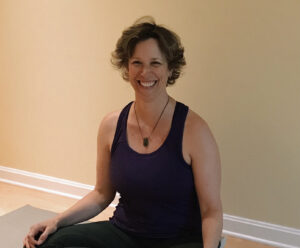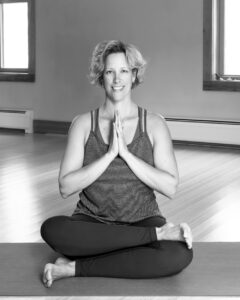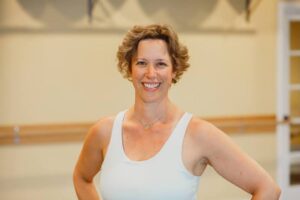In last week’s blog post I began my definition of Trauma Informed Personal Training (TIPT) “as an approach where old roles are abandoned [ex. drill sergeant style Personal Trainer pushing clients hard and aggressively] and a human, whole person centered approach is taken.” But you might wonder, what exactly does that mean?
Whole person centered; human; holistic; bio-psycho-social model; bio-psycho-social-spiritual model; person centered; multidisciplinary; comprehensive; all encompassing; humanistic.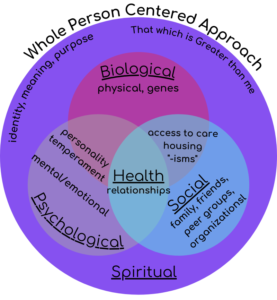
[image created in canva.com, adapted from Kristine Weber, Subtle Yoga]
These are some of the concepts, the models, the perspectives through which I consider health and well being from a trauma informed perspective. The idea here is that we are not just a mechanical body onto which we can apply exercise paradigms, paradigms that were most likely standardized on the average male in 1970, measuring at 5’10” and 150 lbs…not so average for most people then, or now! We are constantly changing and evolving beings (in fact, at the cellular level you have a whole new body every 7 years!). We are also a complex system of being on all levels: biological, psychological, emotional, social, and spiritual.
How are bodies are functioning on any given day or at anytime is a function of much more than what you did yesterday, ate for breakfast, or how well you are sleeping. Those are important too, but often we stop there. Your body is integrated and affected by at least all of your experiences, past and present!
Below are some categories that are part of a “Whole Person Centered” view, with an example of how that might effect someone’s health:
Biology: Sue’s biology includes her physical health current and past and how her inherited genetics may predispose her to any number of experiences: she might have a predominance of muscle fiber type that makes her a better sprinter than marathoner, and her movement practices would reflect this. Alternatively she may have inherited a gene that left her with a birth defect that causes her hip to dislocate. In this case we want to introduce mindful movement that focuses on nourishing and strengthening her hip joint for longevity and mobility.
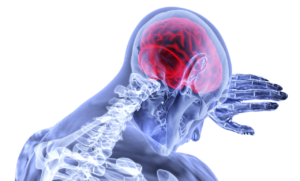 Psychology: how our minds and emotions work are complex and they have an effect on your body (spoiler, they are an integral part of your body)!! Because Alex was born prematurely and spent months in an incubator without enough human touch, their body is more sensitive to touch. For Alex, we’ll have an explicit conversation and identify practices that help them advocate for appropriate touch in the training relationship.
Psychology: how our minds and emotions work are complex and they have an effect on your body (spoiler, they are an integral part of your body)!! Because Alex was born prematurely and spent months in an incubator without enough human touch, their body is more sensitive to touch. For Alex, we’ll have an explicit conversation and identify practices that help them advocate for appropriate touch in the training relationship.
River may’ve been born with a temperament that is quick to react and hot tempered. He might need to balance his hot energy so he doesn’t “burn out” with movements that first match this current energy, cooling down towards restorative practices like self massage and guided relaxation practices.
Social: Finley lives alone, tends more towards introversion, and recently moved to the area. She hasn’t made friends or found much community yet. She mentions that she’s feeling quite lonely. When we feel isolated and lonely a cascade of chemical processes happen in your body that can lead us towards sadness and depression, feeling heavy and unmotivated. Finely reports this is her experience. We make a plan to identify group exercise opportunities that feel interesting and I offer to connect her with a client on my list that might be good fit for some shared sessions that incorporate more partner work and play.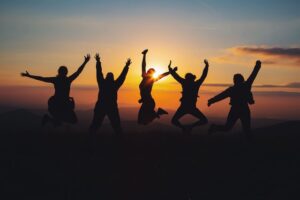
Chris is dealing with both sexism at their job and racism in their wider community. Living with constant stressors like this often means that our bodies are showing up differently for us on the regular, one day high energy, maybe we’re feeling anxious and/or angry, another day super fatigued and heavy, for example. For Chris, we’ll start each session with a brief centering so they can notice how they are feeling or sensing their bodies now. After a brief check in, I’ll chose practices that meet Chris’s nervous system where it is, increasing or decreasing challenge points as desired. We’ll be in communication about what’s working and what is not, and Chris is fully in charge of what is good for them!
Spiritual: for our purposes I’d like to define spiritual as your connection to something greater than yourself. You might call that Mother Nature, God, the Universe, a Higher Power, Energy…whatever language you use to describe that organic intelligence that is greater than you. I believe that we are spiritual beings having a human experience; that we are both spirit and substance.
Devon’s not so sure and he doesn’t want yoga or God talk in his exercise sessions. I assure Devon that we won’t talk about God, I can’t make promises that my yoga won’t come through me in how I show up, but I will remain conscious to not put that on him. We’ll stay focused on his goals. Devon reports that his exercise sessions with me leave him feeling happier, more present, strong and steady in his body. He begins to notice his relationships improving, he has less stress and more energy throughout his days, and he’s connected to his purpose.
Greta is feeling confused. She’s not sure what she wants, but clarity is number one, and she read somewhere that movement can help when you’re stuck. She’s had a hard time sticking to movement practices in the past. We spend some time up front, identifying what’s important to her, clarifying her values through some at home journaling prompts. From those we set intentions and goals for her movement practice that feel accessible and enjoyable. Because Greta is clear on her “why?” her motivation is steady. She begins to notice that her values and intentions are clarifying her purpose and she’s connecting to inspiration.
I hope you found this article clarifies some of the ways that TIPT can support your whole person!
An Invitation to Reflect on Your Whole Person
I invite you to take an inventory of your experience of health through the categories I illustrated above. These reflections are not small. You might chose one that most resonates to explore today, and come back another time. I don’t recommend you try to respond to all of these in one sitting. You might dive deep into one category or chose one contemplation from each area for a more holistic experience. What is good for you? (and that might be skipping it altogether!!!)
Find your journal and comfortable place to write. Take a few moments to settle by noticing the support of your chair, observing your breath for a few moments; and/or simply gazing around the space you are in. Take in a 360 degree view, slowly turning your head in one direction, looking behind you a you allow your spine to twist a little, and then to the other side.
At the top of one page title it Biological. Consider what you know about your genetics and make notes on these. Then journal about your physical health, both past and present. Identify injury and surgery history. What are your daily energy needs? What restores you physically?
Next, Psychological, your mind and emotions. Consider your personality and temperament, your preferences and tendencies. What qualities have been present along the way since childhood? Or qualities that you remember being steady in childhood, but not so much now? Is there a trauma history to consider? How is your self compassion? Your emotional agility and intelligence? Can you settle your mind or does it mostly run your life? Do you have a trusted friend, family member, counselor, minister, therapist you check in with regularly to make space for feeling, reflecting, and being heard?
Take an inventory of your Social groups and connections. Which ones feed you, lift you up, energize, or restore you? Are there groups that drain, weaken, or injure you (subtle or not so subtle!)? Can you add more of the former and weed out the latter? If you are more isolated, can you open your imagination to all the possible ways you could connect through volunteerism, community events, online groups and connecting with old friends that aren’t close by? Two people make a group and that counts! If you are part of a group marginalized in your culture, how do you lean into like minded safe supports?
Spiritually, you may be very clear on your view, religion, practice or you may be very clear there is no such thing. If spirit doesn’t work, let’s talk about “something greater.” I think we can all agree that we are at the mercy of forces greater than us: the weather, meteors, aging and death, the dramas that seem to appear in our lives out of nowhere. The challenges. Those things that happen for no reason at all. How do you ride the storms of living a life? Here I invite you to ponder that which is “greater than us.” Then journal on how you see yourself, your identity. What is your purpose (this can be a loaded, life long exploration, so see what comes up…are there some words to note down or a hard pass? honor that). What do you want to bring to this world in this life? Where do you find meaning and connection? In nature? In your relationships? In an ashram? In silence? In community? Could you use a little more of this?
You can use your reflections to identify areas you might spend more attention on for better health.
May you be happy. May you be healthy. May you be safe. May you live your life in peace and ease!
Remember: this post is for informational purposes only and may not be the best fit for you and your personal situation. It shall not be construed as medical advice. The information and education provided here is not intended or implied to supplement or replace professional medical treatment, advice, and/or diagnosis. Always check with your own physician or medical professional before trying or implementing any information read here.
Private Yoga ~ Personal Training ~ Movement Coaching ~ TRE® Tension & Trauma Release Exercise

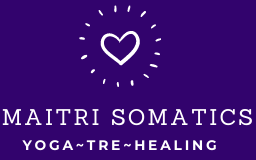
![nghia-le-man on top of the world-unsplash [image courtesy of unsplash.com]](https://maitrisomatics.com/wp-content/uploads/elementor/thumbs/nghia-le-man-on-top-of-the-world-unsplash-pnsnjnvawgnhmf9g7315o2tlk86cl1mli2rt6nv8mo.jpg)
